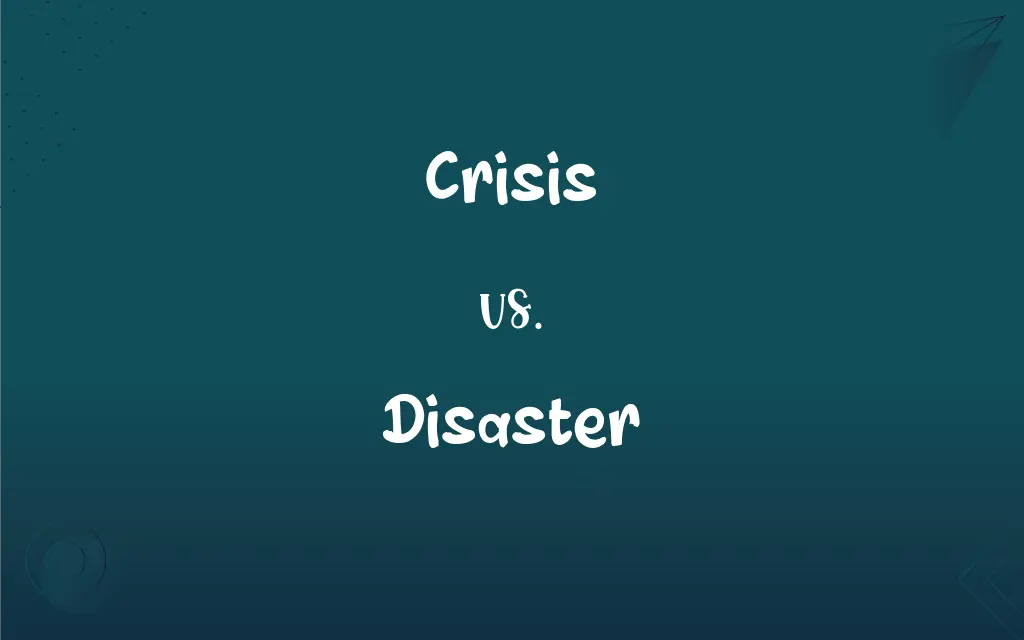Crisis vs. Disaster: What's the Difference?
Edited by Janet White || By Harlon Moss || Updated on November 29, 2023
A crisis is a critical or decisive situation requiring urgent response, while a disaster is a sudden, catastrophic event causing great damage or loss.

Key Differences
Crisis typically refers to a pivotal or critical situation, often involving a difficult or dangerous moment requiring immediate action. Disaster, on the other hand, signifies a sudden, catastrophic event that results in significant harm or loss.
A crisis can be a turning point or a period of high risk that tests the strength and resilience of individuals or systems. In contrast, a disaster usually involves an event with widespread impact, such as natural calamities or large-scale accidents.
Crisis often implies a situation where strategic decision-making is crucial to prevent further escalation or damage. Disaster refers to an event that has already resulted in considerable destruction or loss and requires recovery efforts.
Crisis situations can arise in various contexts, including personal life, business, or international relations, and may not always lead to physical damage. Disaster, however, is typically associated with physical destruction, like in the case of earthquakes, floods, or industrial accidents.
Crisis management focuses on dealing with immediate threats and preventing escalation, while disaster management involves response, relief, and rehabilitation efforts following a catastrophic event.
ADVERTISEMENT
Comparison Chart
Definition
A critical situation demanding urgent response
A sudden, catastrophic event causing great damage
Scale and Impact
Can be limited to specific areas or systems
Usually involves widespread damage or loss
Nature
Often a turning point or high-risk period
Characterized by suddenness and severity
Management Focus
Strategic decision-making, prevention
Response, relief, and rehabilitation
Typical Contexts
Personal, business, international relations
Natural calamities, large-scale accidents
ADVERTISEMENT
Crisis and Disaster Definitions
Crisis
A decisive moment or turning point.
The election represented a crisis in the country's politics.
Disaster
A sudden event causing great damage or loss.
The earthquake was a disaster that affected thousands.
Crisis
A time of intense difficulty or danger.
The financial crisis threatened the company's stability.
Disaster
A serious disruption of the functioning of a community.
The flood was a disaster for the local economy.
Crisis
A time when a difficult or important decision must be made.
The environmental crisis requires immediate action.
Disaster
A natural or man-made event with catastrophic consequences.
The chemical spill was an environmental disaster.
Crisis
A situation that has reached a critical phase.
The diplomatic crisis escalated tensions between the nations.
Disaster
A complete or total failure.
The project turned out to be a financial disaster.
Crisis
A period of uncertainty and potential danger.
The health crisis overwhelmed the hospital's resources.
Disaster
An event causing extreme disruption and distress.
The hurricane was a disaster, leaving many homeless.
Crisis
A crucial or decisive point or situation, especially a difficult or unstable situation involving an impending change.
Disaster
An occurrence causing widespread destruction and distress; a catastrophe.
Crisis
A sudden change in the course of a disease or fever, toward either improvement or deterioration.
Disaster
A grave misfortune.
FAQs
What is crisis management?
Crisis management involves handling a crisis to prevent escalation and minimize impact.
What defines a crisis?
A crisis is defined by a critical situation requiring urgent response.
Can a crisis lead to a disaster?
Yes, if not managed properly, a crisis can escalate into a disaster.
Can personal issues be a crisis?
Yes, personal issues like health emergencies can constitute a crisis.
Is a crisis always negative?
Crises are typically negative but can lead to positive change or opportunities.
Can businesses face crises?
Yes, businesses can face crises like financial troubles or reputational damage.
Are disasters always large-scale?
Most disasters are large-scale, but some can be localized with significant impact.
What is a disaster?
A disaster is a sudden, catastrophic event causing significant damage or loss.
Are all disasters natural?
No, disasters can be natural or man-made, like industrial accidents.
How do communities recover from disasters?
Communities recover through rebuilding, aid, and psychological support.
Can technology predict disasters?
Technology can often predict natural disasters, like storms or volcanic eruptions.
How do governments respond to crises?
Governments respond to crises with emergency plans, resource allocation, and strategic decisions.
What role do NGOs play in disaster relief?
NGOs often provide essential aid and support during disaster relief efforts.
How do individuals cope with disasters?
Individuals cope through resilience, community support, and accessing resources.
What skills are needed for crisis management?
Crisis management requires strategic thinking, decision-making, and communication skills.
Can insurance cover disasters?
Many types of insurance policies cover damages from certain disasters.
What does disaster management entail?
Disaster management involves response, relief, and rehabilitation after a catastrophic event.
Is timely response crucial in a crisis?
Yes, timely response is critical in managing and resolving a crisis effectively.
Are crises always short-term?
Crises can be short-term or evolve into long-term challenges.
What are examples of disasters?
Examples include earthquakes, floods, and large-scale industrial accidents.
About Author
Written by
Harlon MossHarlon is a seasoned quality moderator and accomplished content writer for Difference Wiki. An alumnus of the prestigious University of California, he earned his degree in Computer Science. Leveraging his academic background, Harlon brings a meticulous and informed perspective to his work, ensuring content accuracy and excellence.
Edited by
Janet WhiteJanet White has been an esteemed writer and blogger for Difference Wiki. Holding a Master's degree in Science and Medical Journalism from the prestigious Boston University, she has consistently demonstrated her expertise and passion for her field. When she's not immersed in her work, Janet relishes her time exercising, delving into a good book, and cherishing moments with friends and family.































































